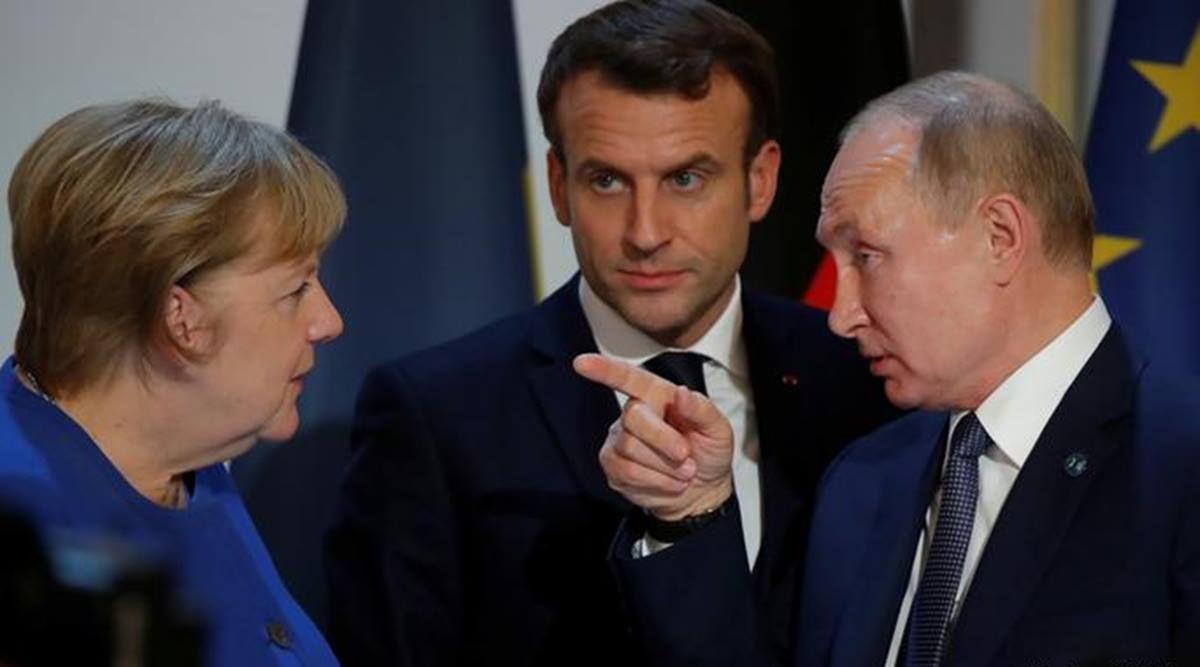 Alexei Navalny 'poisoning' case: The alleged case of poisoning of the fiercest critic of the Russian President Vladmir Putin has deteriorated Russia's relations with the West, with Germany leading the charge of accusations against the Russian government. (Reuters)
Alexei Navalny 'poisoning' case: The alleged case of poisoning of the fiercest critic of the Russian President Vladmir Putin has deteriorated Russia's relations with the West, with Germany leading the charge of accusations against the Russian government. (Reuters)Alexei Navalny ‘poisoning’ case: German Chancellor Angela Merkel Thursday called Russian opposition leader Alexei Navalny’s poisoning an ‘attempted murder’. “There are very serious questions now that only the Russian government can answer, and must answer,” Merkel was quoted as saying by AP.
The test report by a German military lab claims that Navalny was poisoned with the Soviet-era nerve agent Novichok. British authorities identified Novichok as the poison used on former spy Sergei Skripal and his daughter in England. The Russian government, however, rejected these claims and stated that Germany hasn’t formally provided any information about its findings in the case.
Russian government spokesperson Dmitry Peskovhat was quoted as saying by AP that Russian authorities are ‘ready and interested in full cooperation and exchange of information’ with Germany but added that Berlin still hasn’t provided any official response to formal requests from the Russian prosecutor general’s office and doctors who treated Navalny.
Here are the top developments in the Alexei Navalny ‘poisoning’ case:
Germany leads charge against Russia
Navalny’s alleged case of poisoning has led to worsening of Russia’s relations with the West, with Germany leading the charge of accusations against the Russian government. German Chancellor’s spokesperson Steffen Seibert said: “It is a dismaying event that Alexei Navalny was the victim of an attack with a chemical nerve agent in Russia…The German government condemns this attack in the strongest terms.”
It is reported that the German government will inform its partners in the European Union and the military alliance NATO about the test results. Seibert said it wants to consult with them in light of the Russian response “on an appropriate joint response.” Germany also will contact the Organization for the Prohibition of Chemical Weapons, he added.
German Foreign Minister Heiko Maas said the Russian ambassador was summoned to his ministry and told in “unmistakable” terms of Germany’s call for the Navalny case to be investigated “in full and with full transparency.” “We now know that there was an attack with a chemical nerve agent,” Mass said. “That makes it even more urgent to determine who was responsible in Russia and to hold them to account.”
Soviet-era nerve agent ‘Novichok’ touted as chemical weapon used to poison Navalny
Germany has claimed that a chemical weapon in the form of a nerve agent ‘Novichok’ was used to poison Navalny, who felt unwell on a flight back to Moscow from the Siberian city of Tomsk on August 20.
EXPLAINED | The toxic history of nerve agent Novichok
The alleged use of Novichok was last reported in 2018, when former Russian spy Sergei Skripal and his daughter Yulia were poisoned in the city of Salisbury in the United Kingdom. The name Novichok is literally translated as a ‘newcomer’ in Russian, and is used to determine a group of advanced nerve agents developed by the Soviet Union in the 1970s and 1980s.
In September 2017, the Organisation for the Prohibition of Chemical Weapons (OPCW) confirmed about the full destruction of the 39,967 metric tonnes of chemical weapons possessed by Russia. But BBC reports that Novichoks were never declared to the OPCW.
Demands in Germany to rethink Nord Stream 2 pipeline
Reuters reported that German Chancellor Merkel is facing growing pressure to reconsider the Nord Stream 2 pipeline, which will take gas from Russia to Germany, after she said Kremlin critic Alexei Navalny was poisoned with Novichok.
“We must pursue hard politics, we must respond with the only language (Russian President Vladimir) Putin understands – that is gas sales,” Norbert Roettgen, head of Germany’s parliamentary foreign affairs committee, was quoted as saying by Reuters.
“If the Nord Stream 2 pipeline is completed now, it would be the maximum confirmation and encouragement for Putin to continue this kind of politics,” Roettgen had stated earlier.
Nord Stream 2 is slated to double the capacity of the existing Nord Stream 1 pipeline in carrying gas directly from Russia to Germany. Led by Russian company Gazprom with Western partners, the project is more than 90 per cent completed and is expected to be operational from early 2021.